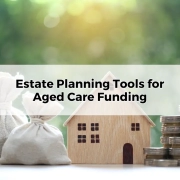Financial Planning for Self-Funded Retirees Entering Aged Care
Table of Contents
ToggleEntering aged care as a self-funded retiree presents unique financial challenges and opportunities. Unlike those who qualify for government subsidies based on means testing, self-funded retirees must carefully structure their assets and income to optimise affordability while maintaining financial security. Understanding the financial framework of aged care is essential, as fees and charges vary significantly depending on the facility, services, and personal financial position.
Aged Care Costs and Fee Structures
Aged care costs are categorised into basic daily fees, means-tested care fees, accommodation payments, and additional service fees. The basic daily fee applies to all residents and covers essential services. Means-tested fees depend on income and assets, impacting the overall cost. Accommodation payments can be structured as refundable accommodation deposits (RADs) or daily accommodation payments (DAPs), with hybrid options available. Additional service fees may apply for premium amenities.
Impact of Income and Assets on Aged Care Fees
The means test for aged care considers both income and assets to determine applicable fees. This assessment includes pensions, superannuation income, rental income, and investment returns. Asset calculations encompass the family home, financial investments, and other real estate holdings. Structuring income streams and asset allocations effectively can mitigate excessive fees and enhance long-term affordability.
Selling or Retaining the Family Home
For self-funded retirees, deciding whether to sell or retain the family home is a pivotal financial decision. The home’s value is exempt from the aged care means test for the first two years if a spouse remains in residence. Selling may provide liquidity for aged care costs, while retaining it can offer rental income. Tax implications and Centrelink assessments must be carefully evaluated.
Superannuation and Pension Considerations
Self-funded retirees often rely on superannuation and private pensions to fund their aged care expenses. The treatment of superannuation varies depending on whether it is held in accumulation or pension phase. Effective pension structuring can reduce taxable income and means-tested fees, preserving capital longevity.
Investment Strategies to Fund Aged Care
Aged care expenses necessitate a review of investment portfolios to ensure sufficient liquidity while maintaining long-term growth. A balanced strategy incorporating income-generating assets, diversified investments, and risk mitigation measures is essential. Cash flow management should prioritise accessibility to funds for ongoing care costs while protecting wealth from market volatility.
Estate Planning and Wealth Preservation
Aged care financial planning should align with estate planning objectives to ensure the preservation of wealth for beneficiaries. Wills, enduring powers of attorney, and advance care directives should be updated to reflect changes in financial circumstances. Strategic gifting and trust structures may also influence aged care means testing and intergenerational wealth transfer.
Taxation Implications of Aged Care Funding
Understanding the tax implications of funding aged care is crucial for self-funded retirees. Capital gains tax (CGT) may apply when selling assets to fund care costs. Pension withdrawals, superannuation income, and investment earnings can impact taxable income. Tax-efficient strategies, such as utilising concessional contributions or tax-free pension income, can optimise financial outcomes.
Government Support and Concessions
While self-funded retirees do not typically receive full government subsidies, certain concessions and entitlements may be available. The Commonwealth Seniors Health Card (CSHC) provides access to reduced prescription costs and medical services. Veterans’ benefits and specific aged care supplements may also assist with funding care expenses.
Financial Planning Strategies for Couples
When one partner requires aged care while the other remains at home, financial planning complexities arise. Structuring assets to maximise the financial security of the spouse at home while optimising aged care affordability requires strategic planning. The treatment of jointly owned assets and income streams influences means-tested fees and Centrelink entitlements.
Navigating Aged Care Agreements and Contracts
Aged care agreements outline service inclusions, costs, and terms of residence. Understanding contractual obligations is essential before committing to a facility. Legal and financial advice should be sought to ensure transparency in fee structures, refundability of deposits, and exit provisions. Hidden fees and service limitations should be carefully scrutinised.
Seeking Professional Financial Advice
Navigating the financial complexities of aged care requires expert guidance. Aged care financial advisers can provide tailored strategies to optimise affordability, minimise fees, and ensure long-term financial security. Engaging with a professional ensures compliance with evolving regulations and access to the best possible care without compromising financial well-being.









